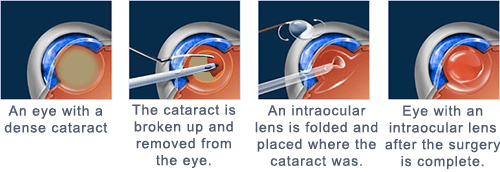About cataract surgery
A cataract is a clouding of your natural lens, which is located right behind the pupil. A normal lens should be clear to allow light to bend into the eye for optimal vision. Over time it becomes clouded due to protein buildup usually caused by environmental exposure. Patients over 55 years of age are usually more at risk for cataract development, although they can occasionally develop in infants and young children. Common symptoms associated with cataracts include glare, halos, and hazy/dull vision. Once these symptoms start to impact your quality of life, your ophthalmologist will then suggest surgically removing the cataract. Ticho Eye Associates will assess the severity of your cataract and will devise the best surgical plan for you. Reach out to any one of our locations in Chicago Ridge, IL, Tinley Park, IL, and Munster, IN.
What are the benefits of cataract surgery?
Surgery not only improves symptoms of cataracts like cloudy vision and halos but can also reduce your dependency on glasses or contacts in everyday situations. This means you will see better, whether driving at night or playing your favorite sports. The team at Ticho Eye Associates is dedicated to helping patients recover quickly from cataract surgery so they can return to their normal lives as soon as possible. Our patients are often excited about their results and the freedom they experience post-surgery.
Am I A Candidate For Cataract Surgery?
In general, any individual with mid- to late-stage cataracts is a possible candidate for cataract surgery if they are in generally good health. Despite this, while laser cataract surgery is incredibly effective, the treatment does have a couple of restrictions. One is that patients with certain types of astigmatism might not be the best candidates, or they may be required to undergo corneal treatment to treat astigmatism before or during both laser and traditional cataract surgery. Further, people who have undergone LASIK previously aren’t often eligible due to the fact that the cataract laser technology can possibly damage the corneal flap formed in order to perform the LASIK surgery. During an assessment at Ticho Eye Associates, one of our experienced ophthalmologists will talk about any likely issues, in addition to each patient’s most practical treatment possibilities.
Cataract Surgery Reviews
Traditional cataract surgery

Traditional cataract surgery is an advanced outpatient procedure that takes about 15 – 20 minutes per eye. First, a small incision is created with a handheld blade within the corneal tissue. Then, a special tool will be used to break up and extract the clouded lens (cataract). Lastly, an artificial lens (or IOL) will be carefully inserted to replace the eye's natural lens. Since the incision is so tiny, it does not require sutures and will heal on its own.
Laser-assisted cataract surgery
Laser-assisted cataract surgery is a more recent advancement in cataract removal. This surgery is a lot like traditional cataract surgery, but we employ state-of-the-art laser technology to determine the incision site, create the cut in the cornea, and break up the cataract for removal. Our remarkable technology plots a very sophisticated map of the eye, which means the lasers can identify the precise site of the cataract. After the cataract is broken apart and removed, we will insert the intraocular lens. Laser cataract surgery provides greater accuracy and faster recovery than traditional surgery.
What can I expect after cataract surgery?
The recuperation process for traditional and laser cataract surgery normally lasts from 4 – 8 weeks, but it differs for each patient. Throughout the healing period, patients have to follow integral post-procedure instructions in order to ensure the best possible progress. Those who receive laser cataract surgery need to use specific kinds of prescription eye drops for most of the healing process, and it is crucial they don't put pressure on or touch the eyes at all as they get better. We may also require some patients to wear an eye patch to avoid this. In the majority of our patients, vision is noticeably improved right after the procedure; however, it remains blurry for 5 – 7 days until the post-procedure inflammation begins to go away. Dr. Ticho recommends that all cataract surgery patients come back in for 2 – 4 follow-up appointments to monitor the recovery process, as well as to make sure the patient's eyesight is progressing normally.
Cataract Surgery FAQs
How painful is cataract surgery?
Cataract surgery is not painful. At the beginning of your laser cataract surgery or traditional cataract surgery, we numb your eyes with special eye drops. Following your procedure, the numbness will subside on its own after a couple of hours.
Are you awake during cataract surgery?
During the surgery, patients are awake. We use a unique eye speculum to hold the eye open and prevent you from blinking. However, before we even start, patients receive eye drops to numb the eye. Throughout your procedure, you will feel some slight pressure, light touch, or cooling water sensation.
How soon can I drive after cataract surgery?
You can usually begin to drive within 24 hours of your cataract surgery. Driving after your cataract surgery will primarily depend on what our ophthalmologists say during your scheduled follow-up appointment the day after your surgery.
Cataract Surgery: know your options
Cataracts develop slowly, and in many cases, patients are unaware of their presence until the later stages. This is why getting routine eye exams is key to your overall ocular health and vision. If you have recently been diagnosed with cataracts and have decided surgery is the next step for treatment, call Ticho Eye Associates. We are conveniently located in Chicago Ridge, IL, Tinley Park, IL, and Munster, IN.




